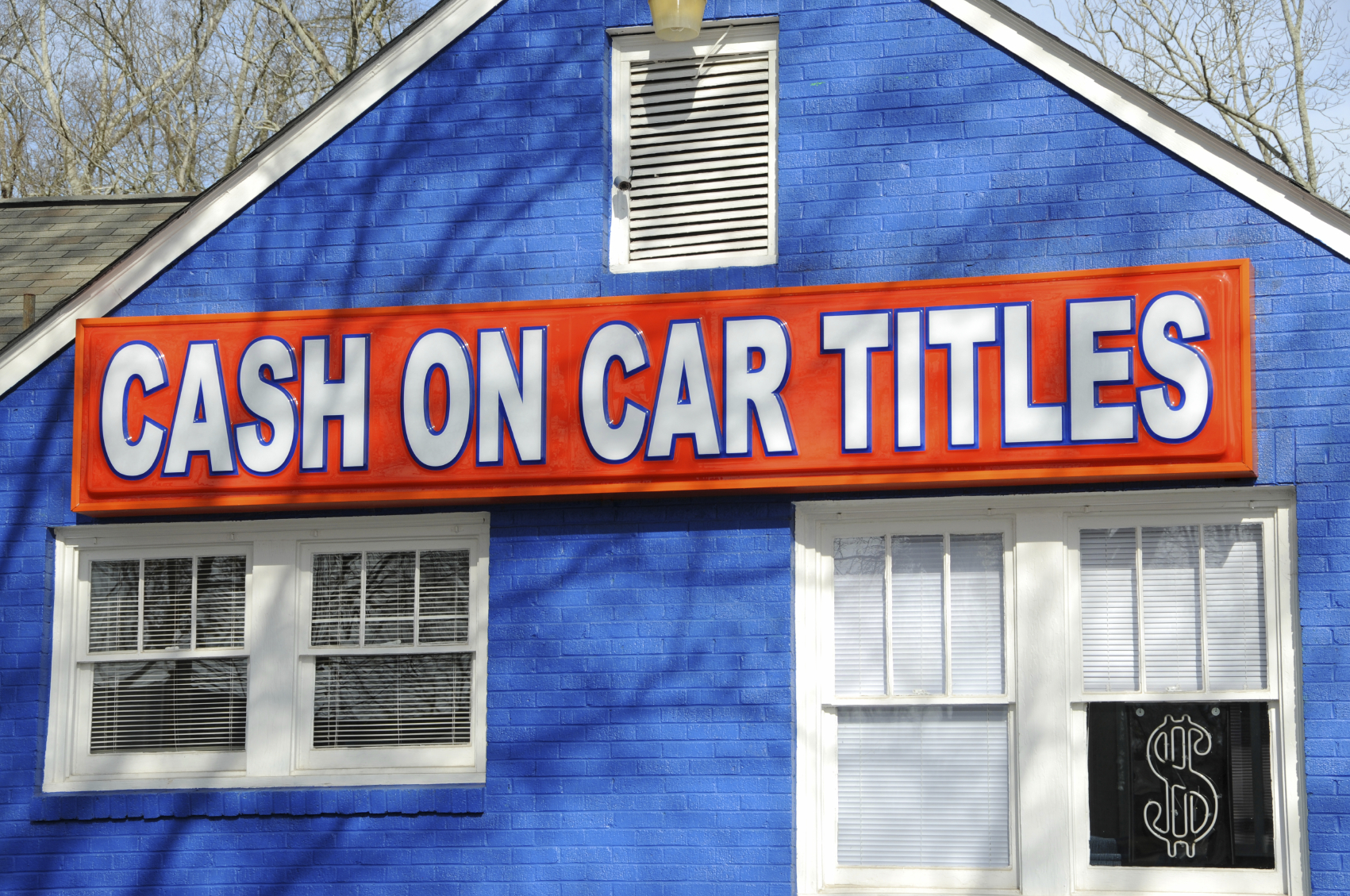
JUNE 19, 2017
|
Insights
Case currently before Virginia Supreme Court would make car title lenders’ numbers more transparent
http://www.richmond.com/news/request-for-information-on-predatory-lenders-weighed-by-supreme-court/article_666b3124-60a7-5771-a4ed-e5c0e6b598dd.html
By Jay Speer
Motor-vehicle title lenders made nearly $161.6 million worth of loans in Virginia in 2015, the most recent year available from the state Bureau of Financial Institutions.
The average loan amount: $1,009. The average annual interest rate: 221 percent.
The report also notes that of 134,655 people who took out loans that year, 51,370, nearly 40 percent, failed to make a payment for at least 60 days.
That was up from 38,286 the year before and close to double the 26,800 who failed to make a payment for 60 days in 2012. Repossessions by title lenders also surged over that time frame, from 13,061 in 2012 to 20,448 vehicles in 2015.
A case argued before the Virginia Supreme Court last week could decide whether the state has to divulge information that breaks that information down by individual lender.
“The whole point is to provide transparency and sunlight on what is a pretty questionable practice,” said Sen. Scott Surovell, D-Fairfax, who argued before the court on behalf of an investigative reporting organization that sought detailed information on how many loans, defaults and repossessions were the work of Virginia’s three largest title lenders: Fast Auto Loans, TitleMax and Loan Max.
***
The Center for Public Integrity, a nonprofit investigative news organization, sought to delve deeper into the numbers, requesting the 2014 reports the lenders had filed from the bureau as part of an investigation into the cost of title loans across the country.
The filings were required as part of legislation passed by the General Assembly in 2010 to regulate the industry, widely criticized as predatory because of its high interest rates and fees and marketing promising quick cash. The Virginia Poverty Law Center has called the loans “a disaster waiting to happen” for borrowers.
For example, this disclosure appears at the bottom of Fast Auto Loans’ Virginia website:
“For a typical motor vehicle title loan of $1,000 with a term of 12 months, the APR would be 246.36 percent,” it reads. “The finance charge would be $1,757. The payment schedule would be: 11 monthly payments of $229.74 and 1 monthly payment of $229.86, provided all payments are made on their scheduled due dates.”
The General Assembly allowed loans at up to 267 percent interest but required the lenders to file an annual report to the Bureau of Financial Institutions to keep tabs on the industry. The information had customarily been complied into an aggregate report, without identifying individual companies. As of Dec. 31, there were 26 motor vehicle title lenders in Virginia operating out of 442 offices, according to the bureau.
Though the Bureau of Financial Institutions seemed inclined to grant the Center for Public Integrity’s request, in November of 2015, it notified the lenders that it would release the information unless they filed petitions with the State Corporation Commission.
All three did and sought to block the release of the information.
Attorneys for Anderson Financial Services, doing business as Loan Max, requested that “no portion of the 2014 annual report, and no specific information regarding Loan Max, be produced to the center as the 2014 report and the information it contains is not public information and is considered by Loan Max to be confidential.”
TitleMax, in its response to the bureau, said “such information should not be released, and should be redacted from any production, because it constitutes ‘personal financial information,’ which the confidentiality rules expressly exempt from disclosure.”
The company wasn’t talking about its customers’ information. Instead, it argued that the State Corporation Commission’s confidentiality rules define “person” as “any individual, corporation, partnership, association, cooperative, limited liability company, trust, joint venture, government political subdivision, or other legal or commercial entity.”
TitleMax also argued that its income statements and balance sheets, among other information in the report, would “cause irreparable damage” and deal a blow to the company’s competitive position if released.
An email to TitleMax seeking comment was not returned. A lawyer who represented Fast Auto Loans could not be reached for comment Friday.
***
In response to the title lenders, the bureau wrote that it was “not persuaded by the arguments raised by the petitioners regarding the confidentiality of the reports and is unaware of any statutory or other legal basis preventing the reports from being treated as public records.”
However, it recommended that the State Corporation Commission begin a formal proceeding to adopt regulations concerning the issues the case raised.
In 2014, the bureau noted, the General Assembly amended state law governing the public availability of records of the State Corporation Commission, which the Supreme Court decided in 2011 was exempt from the Virginia Freedom of Information Act.
“Under this rule, information will be treated as confidential ‘only where the party requesting confidential treatment can demonstrate to the satisfaction of the commission that the risk of harm of publicly disclosing the information outweighs the presumption in favor of public disclosure,’” the bureau’s staff wrote.
Last year, the commission ruled that the bureau should continue to release the aggregate report, not the individual reports sought by the Center for Public Integrity.
It said ‘personal financial information’ was an ambiguous term.
“We find that the bureau’s historical practice of providing cumulative data on all motor vehicle title lender licensees to the public on an aggregate basis should continue pending further clarification through the legislative or regulatory process,” the commissioners wrote, directing the bureau to seek “legislative clarification” during the next General Assembly session.
The Center for Public Integrity appealed the order to the Supreme Court, which heard the case Wednesday.
“We feel that it’s an important decision on exactly what is a public record,” said Allan Holmes, a reporter and editor at the center. “There’s a lot more information in these financial reports that can shed light on how many loans they have, what interest rates they charge, how many times regulators have cited them for problems, things like that.”
Surovell, who was representing the Center for Public Integrity, squared off against John F. Dudley, an attorney for the commission.
Surovell argued that the SCC, whose members are called judges, punted rather than decide the issue.
“We go to courts to resolve disputes,” he said. “We go to courts to make decisions.”
Dudley argued that there was nothing in the law that required the commission to release the requested records.
The justices’ questioning centered on whether the commission had a duty to produce the records and whether the reports are “regulatory records” or “administrative records,” among other queries. A ruling will come later.
***
Seventeen states plus the District of Columbia either cap interest rates so low that lenders don’t set up shop there or bar the use of a vehicle title as a collateral for a loan, said Lisa Stifler, deputy director of state policy for the Center for Responsible Lending. The center is a North Carolina nonprofit that aims to protect low-income communities from predatory lending.
Car title loans, the center said in a January report, drain about $3.8 billion in fees from people in about 22 states. A typical loan is refinanced eight times, the center says, meaning that the loans extract twice as much in fees as the credit extended.
“Car-title lending and payday lending are predatory loan products. They’re predatory because of the debt-trap model and high fees and the unaffordability,” Stifler said.
Though better loan options for low-income people with bad credit exist, Stifler said, many are lured in by deceptive advertising promising a quick fix.
“They are everything but a quick fix, and they end up leading people into a long-term debt trap,” she said.
-Jay Speer is Executive Director of the Virginia Poverty Law Center.
get involved
